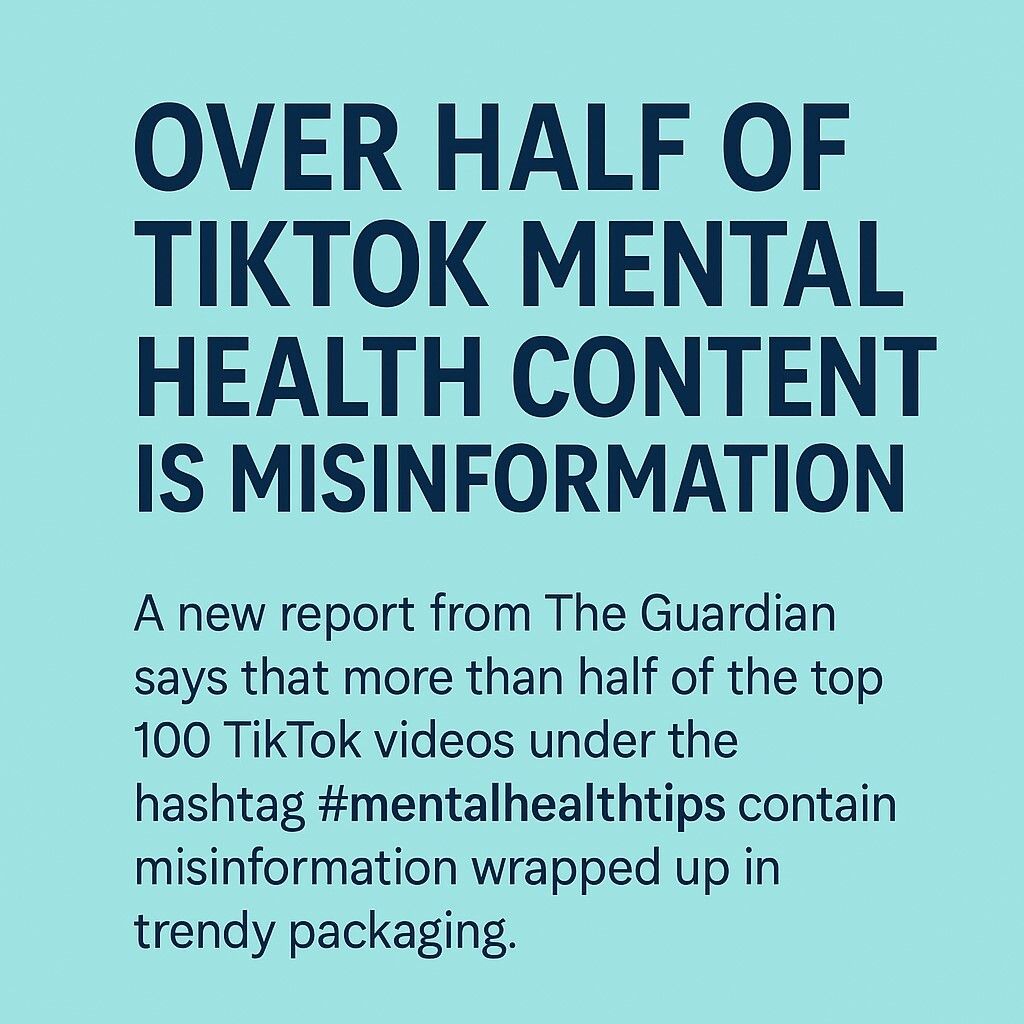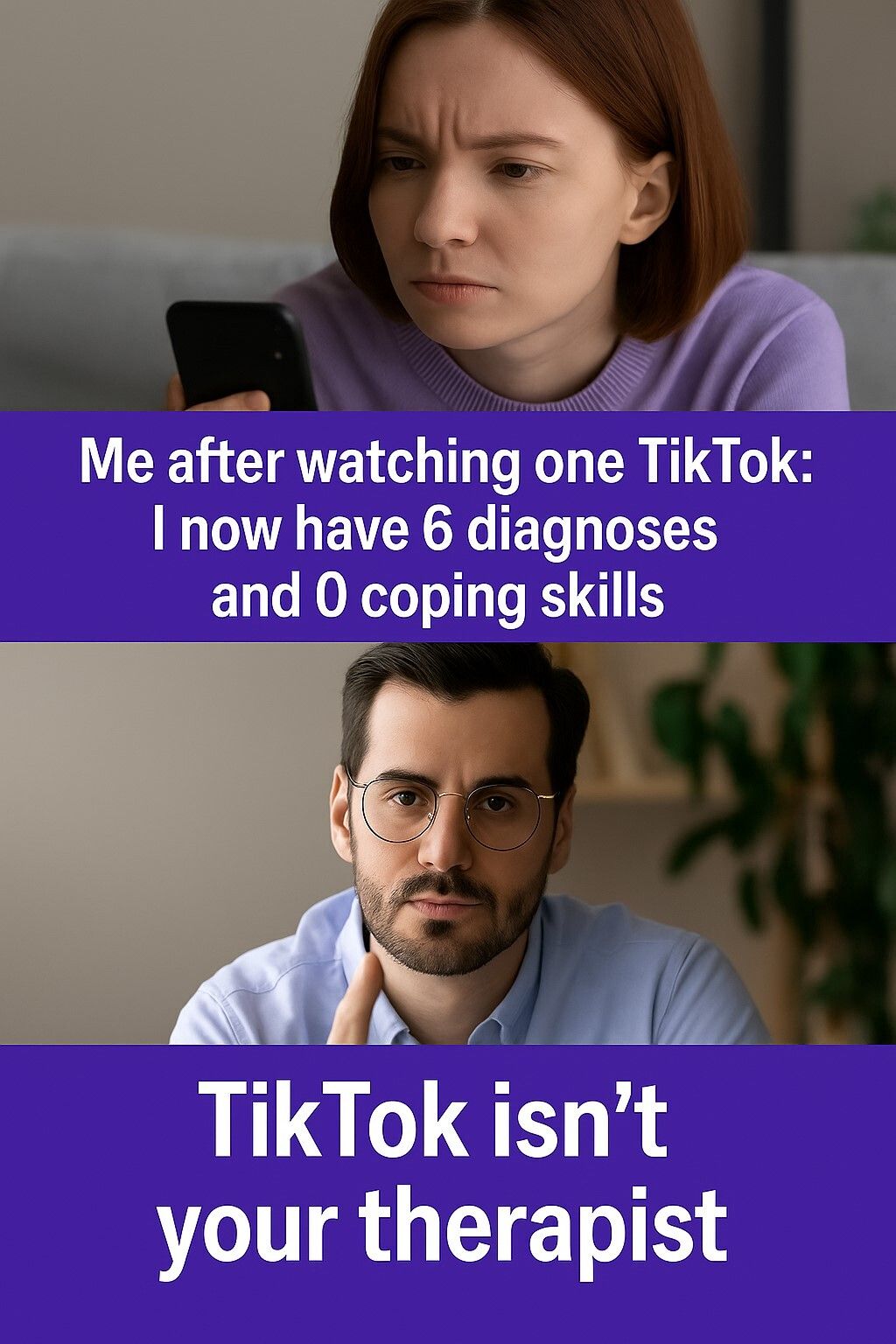- MindWatch
- Posts
- Eat an orange, cure your anxiety?
Eat an orange, cure your anxiety?
The Viral King of Mental Health Misinformation

There’s a new king of mental health in town. It’s TikTok, the popular & controversial Chinese-owned social media platform that specializes in short videos.
The problem?

Better deemed as TikTok - King of Mental Health Misinformation. 🤦♂️
I am not surprised. I could write about other social media platforms that are providing misinformation about mental health, but it seems that TikTok strikes a pose on the gold medal platform. 🥇
The recent report from The Guardian found that 52 of the 100 most popular TikTok videos under #mentalhealthtips contain misinformation. Other media outlets, including Fox News and People Magazine thought it was also important to report the alarming findings of the study.
Not soft science. Straight up Misinformation.
These aren’t random low-view posts either. These are viral videos, shared by creators with millions of followers. The vast majority of the creators I saw have no clinical training, little accountability and what seems to be little regulation. Just a ring light, a trending sound, and a message that sounds helpful until you realize how much harm it actually does.
This isn’t just bad advice. It’s stigma in a slick outfit and jingle. It’s the same old shame, now with catchy GIFs and video text captions.

It’s not like this is the first time we’ve seen TikTok receive bad press. It was banned for national security concerns and data privacy issues. Here’s a helpful timeline that covers most of the app’s history.
Those are serious concerns and certainly things we should all care about in addition to the accuracy of mental health content.
When people casually use words that are mental health conditions like anxiety, trauma, narcissist, bipolar, or ADHD without understanding what they mean, they aren’t educating anyone. They are misusing and encouraging the self-diagnosis of mental health disorders. They’re distorting the conversation. And they’re making it harder for real people with real struggles to speak up.
That’s not awareness. That’s performance without substance.

Here’s what’s getting passed off as mental health treatment.
The Guardian called out examples like:
“Eat an orange in the shower to eliminate anxiety.”
“Write for 15 minutes to cure trauma in 1 hour.”
I took it a step further and did my own search, and this is what I found from my anecdotal searches (my reactions are in italics):
“You overthink? Must be ADHD.” Probably not.
“Tired? Probably depression.” It’s possible, but you’re more likely to need a few nights of good sleep.
“Friend didn’t text back? Definitely a narcissist.” Ridiculous.
On their own, they are making something fairly nuanced and complex overly simplistic. And repeated over and over, with thousands of likes and comments saying “so real,” they start to be accepted by TikTok culture, or even worse parts of society as a whole. This is not true support for those who need real help but cultural noise. And that noise becomes stigma as it encourages people with depression, ADHD, or bipolar disorder that have the real issues to remain silent.
This kind of content doesn’t inform. It erodes trust in the helping professions, enhances stigma, and hinders people from getting the real help they need.
And when someone finally makes it to therapy, they’ve often already tried these so-called hacks. And when the hacks don’t work, they experience shame because they believe they’re too broken to get help. Not because they are, but because TikTok told them healing should be fast, easy, and aesthetically pleasing.
TikTok’s reducing suffering to a 30-second tip isn’t healing. It’s branding for likes and comments.

Actually, the opposite is true about healing. Engaging in mental health counseling can be more difficult than easy, take months before you start to feel better, and often requires pain to achieve real growth & transformation.
Real mental health recovery takes time. Mental health isn’t a viral trend.

That’s why I created this newsletter,🧠MindWatch👁. Not to compete with viral pseudo-therapeutic content that enhances the stigma, but to push back against stigma. To tell the truth, even when it's slower, facilitated by silence & reflection, and is widely less liked.
If you’re tired of the cultural noise that’s confusing, please know you’re not alone. Reach out to me, let’s chat! Which reminds me…
One thing to do

Reply to this email sharing what you’ve seen in this area.
What’s the worst mental health “tip” you’ve seen go viral? Was it from the news? Another social media site? Hit reply or email me at [email protected]. 📝I’d love to hear what you’re noticing too. I’ll read and reply to every email.
Until next time, come back…be here.
Keith